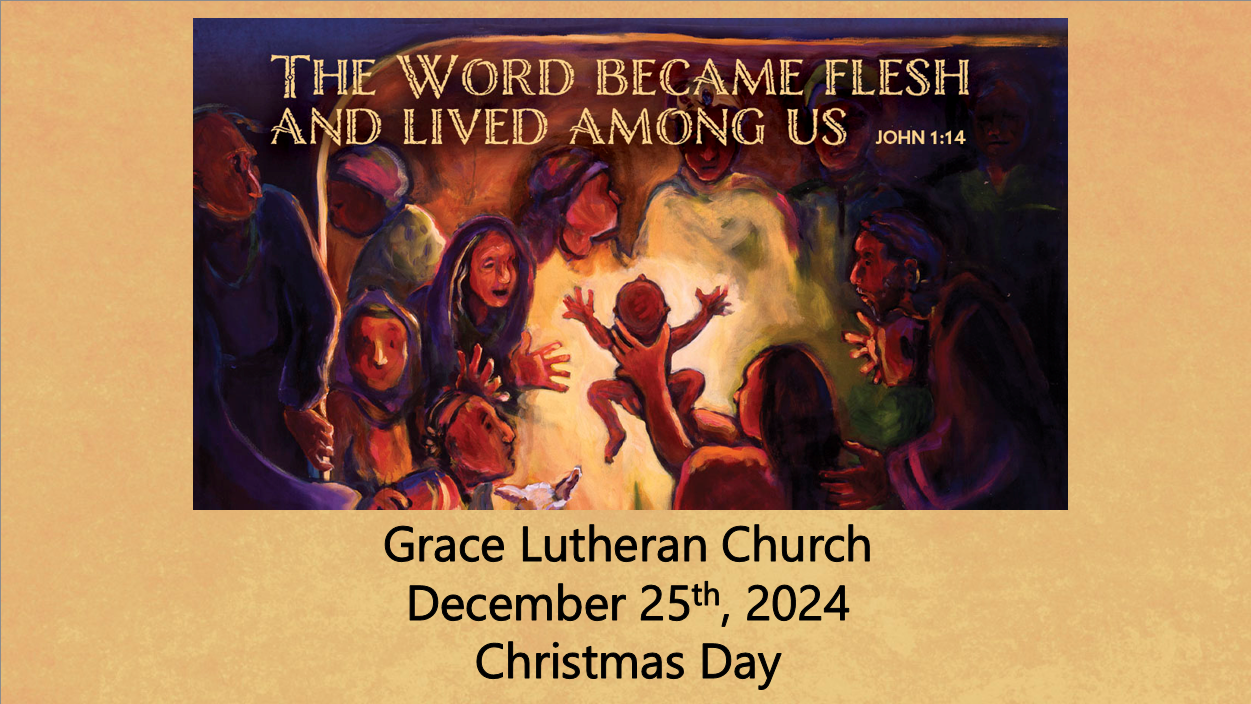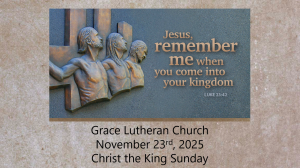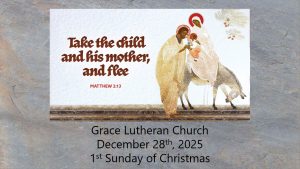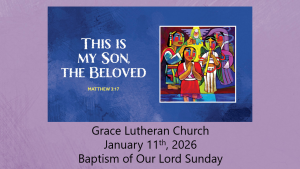Hello everyone,
Merry Christmas! Welcome to worship for this Nativity of our Lord, Christmas Day, December 25, 2024!
The bulletin for this service can be found here. In it, you’ll find the order and words of worship as well as the full sermon manuscript. You can use the bulletin to follow along with the service, or by using the words that will appear on your screen. The sermon is also included on this page under the worship service video.
If you’d like an enhanced online worship experience, you can have a candle in your space, lit at the beginning of the service and extinguished near the end when the altar candles are extinguished after the sending hymn. You are also welcome to participate in communion if you are comfortable, by having something small to eat and drink prepared. Further instruction will be given at the appropriate time.
May the love of the Christ child shine in your hearts, this day and always!
Holy God, through the power of your Spirit may our eyes and ears be opened and our hearts illumined that we might see and hear Christ your living Word and accept his presence with us as one of us, in your name. Amen.
Here we are again, Christmas…
I’m just kidding. I mean, it is Christmas and we certainly are here, but if you were at our Christmas Eve service last night, you would have heard me poking fun at how often I actually open our Christmas sermons with that exact phrase. I’m not going to reuse last night’s sermon, as tempting as that might be, seeing as how we’re gathered here this morning for basically for the same exact reason.
The same reason, yes, but different texts. The same event is highlighted, but we are told about it through different stories. It’s pretty much the same message, but we get very different words from last night and this morning, and they almost seem to be saying very different things.
Yesterday we had shepherds and angels and a baby and all that typical Christmas stuff that you’d expect. And today… not so much. Today we don’t get any of that feel good stuff. We just get this somewhat nonsensical and almost contradictory philosophical language that perhaps confuses more than it comforts.
Seriously, the Word was there in the beginning and the Word was with God and the Word was God? And then the light and darkness and this and that? Not exactly the Christmas story we’re used to. Not exactly the story and characters that we could easily sing or make and display a diorama about. Not exactly the familiar and warm and comfortable story of a pregnant underaged and unwed woman not given a choice but to give birth in a barn while surrounded by farm animals. Instead, we might struggle with relating to this text. We might find it somewhat more of a head scratcher compared to very understandable immaculate conception and virgin birth. We might not really get the festive feelings, the holiday happiness, and the Christmas cheer from this one, because it just seems so out there.
It’s just a bit too philosophical. A bit too different from what we expect for a Christmas text. A bit too detached from our normal speech that it just doesn’t seem relatable to us.
Well, maybe in Western culture and thought at least. Let’s not forget that this was written at a very different time about 2000 years ago to a very different people. Or peoples, as we’ll talk about in a moment. See, in the original Greek language that this text was written in, the word used for “word” is the Greek “logos,” which of course literally means “word” but it’s the nuances the word in this context carries that changes things up a bit. Don’t forget that the ancient Greeks were big on that philosophy, and so logos is much more than the spoken or written word, but it encapsulates the intention behind the word, the reasoning that the word has, the logic that it brings forth.
So in the beginning was God’s intention for the world, God’s specific and divine reasons for a creation, God’s logic in putting things where they go and how they can interact with each other. This would have been very understandable to the people that spoke the original language and lived in that original cultural backdrop, and it would have had a lot of meaning. Because being told this, learning this, believing this would give us purpose. It tells us that creation wasn’t just a random smattering of atoms and molecules and stuff that joined together in just right order and time to create life, but rather it was on purpose, it was intentionally to fulfill an idea and plan, there is logic behind all of this, what we might perceive as chaos. And to an intellectual or philosopher, there is comfort in that. It tells us that we aren’t meaningless and arbitrary beings, but we have value and worth. It means that things actually do mean something, our actions actually do make a difference, that we actually do matter. That is for the Greeks of the time.
But this text also speaks to the Israelites of the time as well, but in a different but no less meaningful way. See, the language this passage starts with, “in the beginning,” to anyone who has read the Genesis accounts, must evoke images of creation, the separation of the light and the darkness, the birth of all things, living or otherwise. This text is saying to the ancient Jews that at creative power that spoke the cosmos into existence, that willed together a world full of wonder, that breathed life into all living beings, was with God since the beginning and was God in every way possible. Because it was by speaking that God created. It was by God’s voice that all things came into being. It was God’s very Word that brought everything that ever was, is, and will be into existence. This will remind the Israelites what a force to be reckoned with God is. And how they need to respect and honour this power. And above all, how much this power is on their side, with them, rooting for them, and setting them apart to receive gracious blessing and mercy.
So while to the Greeks this Word speaks to the why things are the way they are, because they were created with logic, to the Israelites this Word reveals the how things are the way they are, which is through the sheer and utter power of God.
Both of these understandings give us divine meaning and purpose. Both are inspiring, uplifting, and empowering in reminding us of who we are, why we are, and how we are. But that isn’t the most shocking part of this peculiar Christmas story that we get out of John. I mean, sure, God is logic and power, and was that since the beginning when God created everything and continues to be that throughout all of time which fills us with hope and joy, but the most surprising part about this all powerful and all logical Word is that… it became flesh.
Human flesh. Starting out in the form of a baby like all other human flesh did.
A baby. A squishy, squirmy, squeezy baby. The absolute power of the universe, in diapers. The ultimate logic of all time, dependant on a young girl who as of yet has no fixed address. The will, the wisdom, the Word of God, encapsulated in a human body. This is an astonishing truth. It is an astounding promise. It is an astronomical reality that all that God is, everywhere that God is, and everything that God has done can be fit into a tiny infant.
See while the Word tells the Greeks why and the Word tells the Israelites how, the Word tells all people, what. In that, through what did this logic come to us, by what did this power enter our lives, and for what did this Word become flesh? John’s Christmas story tells us that the what, is love.
It is by God’s love that God created all things. It is through God’s love that God reaches out to have a relationship with us. It is because of God’s love that God graciously saves us through the life and actions of Jesus Christ, born unto us this day.
My friends, this passage out of John might not be what we expect for Christmas, although we get it every Christmas at least once. This philosophical text that we get today probably won’t fill us with feel-good feelings like the nativity story, which we might prefer. This truth about who Jesus is in the great and grand scheme of things really isn’t the usual Christmas message. But this is the story that we need, this is the promise that fills us with hope and peace, this is the message of Christmas, that reminds us of God’s will for us as God’s people, God’s power in lifting us up and healing us from our hurts and pains and broken relationships, and God’s love for each and every one of us, graciously redeeming us and saving us, this day and always.
No, this isn’t the Christmas story that we’re used to, but it is very much Christmas. In that God’s Word becoming flesh and bringing light into the world is what draws us to this day, brings us to worship, and beckons us to live with each other in community and love.
So in this Christmas season, may we always be reminded of who we are and whose we are as God’s people, dearly beloved enough for God to be one of us just to be with us, revealing to us all hope, peace, joy, and love, through Jesus Christ our Lord. Thanks be to God. Amen.




